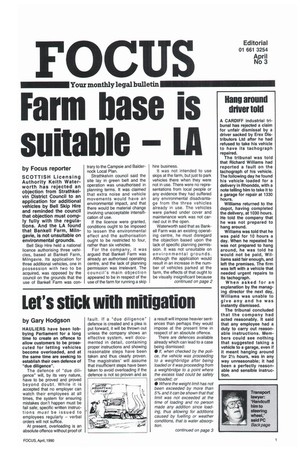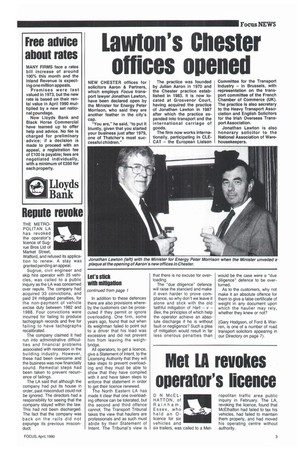Let's stick with mitigation
Page 3

Page 5

If you've noticed an error in this article please click here to report it so we can fix it.
by Gary Hodgson
HAULIERS have been lobbying Parliament for a long time to create an offence to allow customers to be prosecuted for letting vehicles become overloaded, and at the same time are seeking to establish their own defence of "due diligence".
The defence of "due diligence" will, by its very nature, have to be proved and proved beyond doubt. While it is accepted that no employer can watch their employees at all times, the system for ensuring mistakes don't happen must be fail safe; specific written instructions must be issued to employees regularly — verbal orders will not suffice.
At present, overloading is an absolute offence without proof of fault. If a "due diligence" defence is created and a plea is put forward, it will be thrown out unless the company shows an effective system, well documented in detail, containing proper instructions and showing reasonable steps have been taken and thus clearly proven. The magistrates' will assume that insufficient steps have been taken to avoid overloading if the defence is not so proven and as a result will impose heavier sentences than perhaps they would impose at the present time in respect of an absolute offence.
There are defences available already which can lead to a case being dismissed: • If, when checked by the police, the vehicle was proceeding to a weighbridge after being loaded or it was proceeding from a weighbridge to a point where The excess load could be safely unloaded; or • Where the weight limit has not been exceeded by more than 5% and it can be shown that that limit was not exceeded at the time of loading and no person made any addition since loading, thus allowing for additions caused by fuelling or weather conditions, that is water absorption. In addition to these defences there are also provisions whereby the customers can be prosecuted if they permit or ignore overloading. One firm, some years ago, found that out when its weighman failed to point out to a driver that his load was excessive and did not prevent him from leaving the weighbridge.
All operators, to get a licence, give a Statement of Intent, to the Licensing Authority that they will take steps to prevent overloading and they must be able to show that they have compiled with it and have taken steps to enforce that statement in order to get their licence renewed.
The North Eastern LA has made it clear that one overloading offence can be tolerated, but the second and third offence cannot. The Transport Tribunal takes the view that hauliers are professionals and as such must abide by their Statement of Intent. The Tribunal's view is that there is no excuse for overloading.
The 'due diligence" defence will raise the standard and make it even harder to prove compliance, so why don't we leave it alone and stick with the old faithful mitigation of Hart v Bex, the principles of which help the operator achieve an absolute discharge if he is without fault or negligence? Such a plea of mitigation would result in tar less onerous penalties than would be the case were a "due diligence" defence to be overturned.
As to the customers, why not make it an absolute offence for them to give a false certificate of weight in any document upon which the haulier may rely, whether they knew or not?
(Gary Hodgson, of Ford & Warren, is one of a number of road transport solicitors appearing in our Directory on page 7).
























































































































































